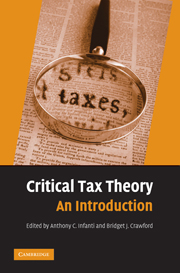Book contents
- Frontmatter
- Contents
- List of Illustrations
- List of Tables
- List of Contributors
- List of Common Abbreviations
- Introduction
- CHAPTER 1 FOUNDATIONS OF CRITICAL TAX THEORY
- CHAPTER 2 HISTORICAL PERSPECTIVES ON TAXATION
- CHAPTER 3 THE GOALS OF TAX POLICY
- CHAPTER 4 CRITICAL TAX THEORY MEETS PRACTICE
- CHAPTER 5 RACE AND TAXATION
- CHAPTER 6 GENDER AND TAXATION
- CHAPTER 7 SEXUAL ORIENTATION AND TAXATION
- CHAPTER 8 THE FAMILY AND TAXATION
- CHAPTER 9 CLASS AND TAXATION
- CHAPTER 10 DISABILITY AND TAXATION
- CHAPTER 11 GLOBAL CRITICAL PERSPECTIVES ON TAXATION
- Toward a Global Critical Feminist Vision: Domestic Work and the Nanny Tax Debate
- The Taxation of Undocumented Immigrants: Separate, Unequal, and Without Representation
- Prying Open the Closet Door: The Defense of Marriage Act and Tax Treaties
- Missing Africa: Should U.S. International Tax Rules Accommodate Investment in Developing Countries?
- Global Trajectories of Tax Reform: The Discourse of Tax Reform in Developing and Transition Countries
- CHAPTER 12 CRITICAL PERSPECTIVES ON CRITICAL TAX THEORY
- Index
Prying Open the Closet Door: The Defense of Marriage Act and Tax Treaties
Published online by Cambridge University Press: 04 August 2010
- Frontmatter
- Contents
- List of Illustrations
- List of Tables
- List of Contributors
- List of Common Abbreviations
- Introduction
- CHAPTER 1 FOUNDATIONS OF CRITICAL TAX THEORY
- CHAPTER 2 HISTORICAL PERSPECTIVES ON TAXATION
- CHAPTER 3 THE GOALS OF TAX POLICY
- CHAPTER 4 CRITICAL TAX THEORY MEETS PRACTICE
- CHAPTER 5 RACE AND TAXATION
- CHAPTER 6 GENDER AND TAXATION
- CHAPTER 7 SEXUAL ORIENTATION AND TAXATION
- CHAPTER 8 THE FAMILY AND TAXATION
- CHAPTER 9 CLASS AND TAXATION
- CHAPTER 10 DISABILITY AND TAXATION
- CHAPTER 11 GLOBAL CRITICAL PERSPECTIVES ON TAXATION
- Toward a Global Critical Feminist Vision: Domestic Work and the Nanny Tax Debate
- The Taxation of Undocumented Immigrants: Separate, Unequal, and Without Representation
- Prying Open the Closet Door: The Defense of Marriage Act and Tax Treaties
- Missing Africa: Should U.S. International Tax Rules Accommodate Investment in Developing Countries?
- Global Trajectories of Tax Reform: The Discourse of Tax Reform in Developing and Transition Countries
- CHAPTER 12 CRITICAL PERSPECTIVES ON CRITICAL TAX THEORY
- Index
Summary
Following President Bush's endorsement of a constitutional ban on same-sex marriage, a conservative, “pro-family” organization wrote the IRS Commissioner to alert him about “a potential fraudulent tax scheme.” The organization was alarmed by “rebellious state and local officials reportedly permitting persons of the same sex to marry in flagrant disobedience of applicable laws defining marriage as a union between a male and a female,” and was further alarmed by the prospect that these “married” same-sex couples (their quotes, not mine) might attempt to file joint federal income tax returns. The organization urged the Commissioner to deter these individuals from attempting to evade income tax by threatening to investigate and prosecute any same-sex couples who attempt to file joint returns.
In [its response], the IRS went beyond the narrow circumstances that alarmed the conservative organization and spoke more generally about the ability of married same-sex couples to file joint federal income tax returns. Citing section three of the Defense of Marriage Act (DOMA), which precludes the recognition of same-sex marriages for purposes of federal law, the IRS reassured the organization that
[e]ven though a state may recognize a union of two people of the same sex as a legal marriage for the purposes within that state's authority, that recognition has no effect for purposes of federal law. A taxpayer in such a relationship may not claim the status of a married person on the federal income tax return.
Putting aside the questionable constitutionality of DOMA, the IRS was technically correct in making this statement – but only because the statement was confined to the tax treatment of domestic same-sex marriages.
- Type
- Chapter
- Information
- Critical Tax TheoryAn Introduction, pp. 341 - 347Publisher: Cambridge University PressPrint publication year: 2009



